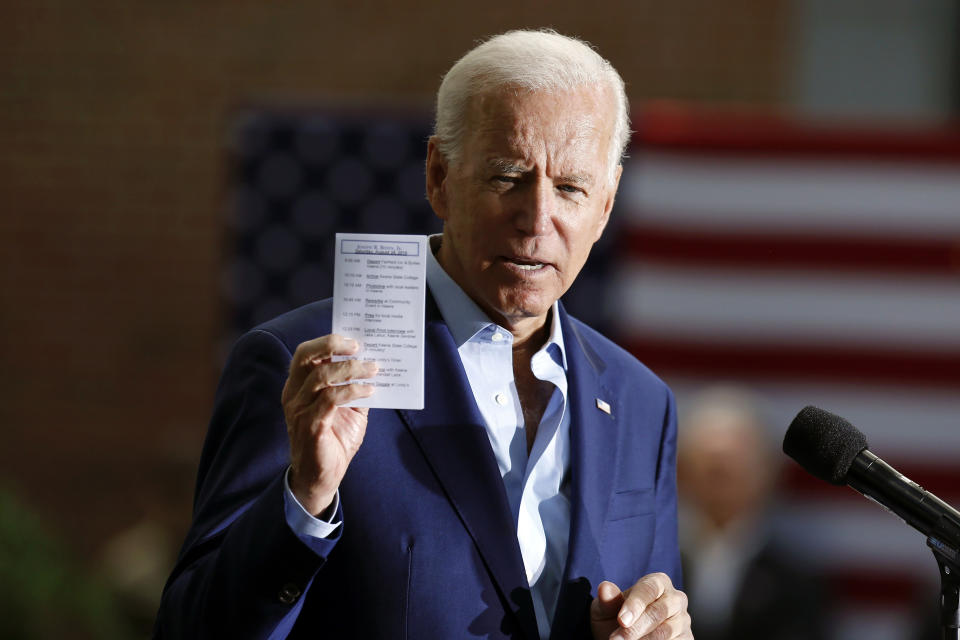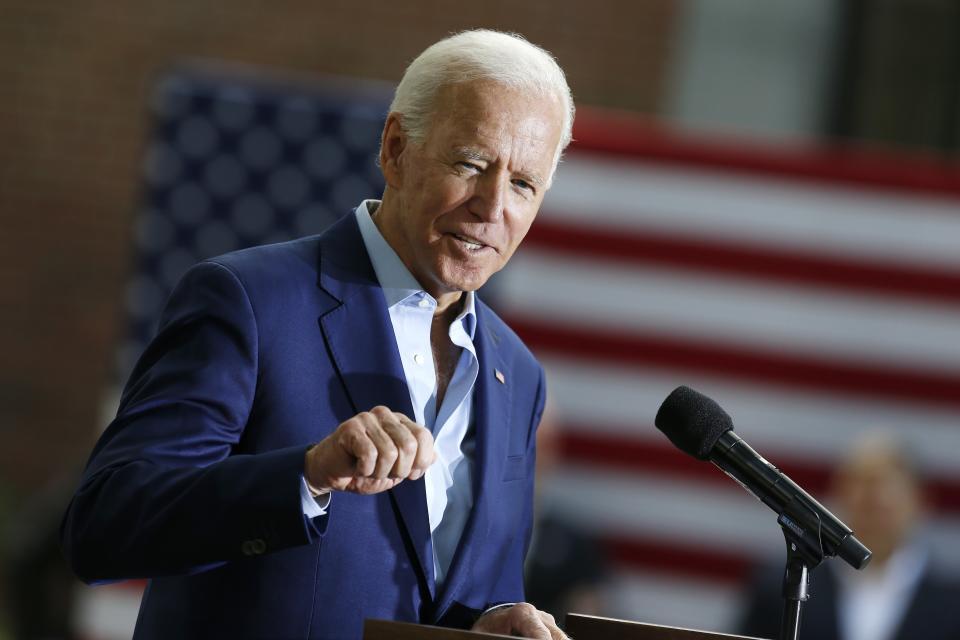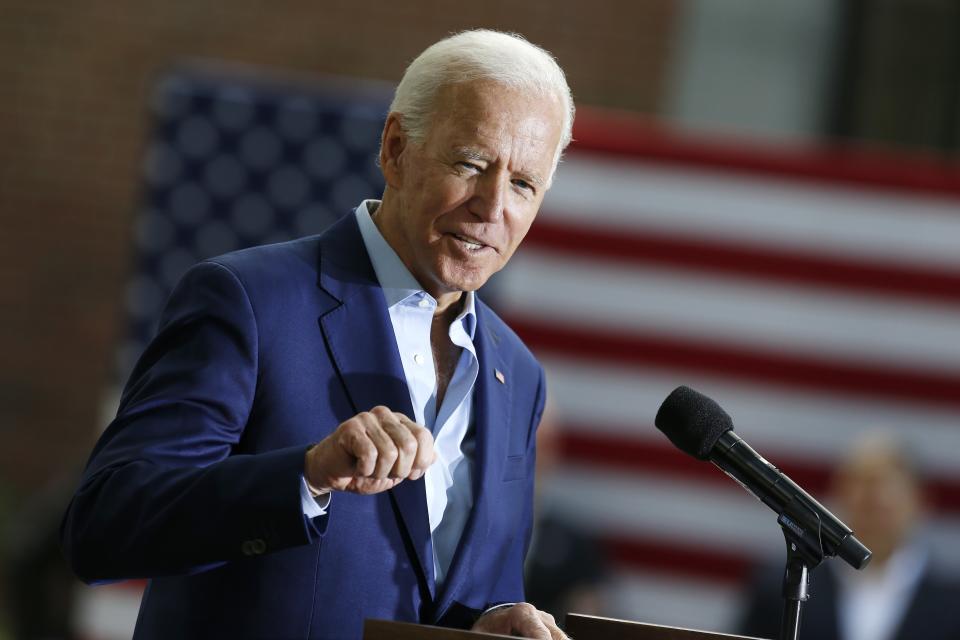Biden health plan aims far beyond legacy of 'Obamacare'
WASHINGTON (AP) — Wrapping himself in the legacy of "Obamacare," Joe Biden is offering restless Democrats a health care proposal that goes far beyond it, calling for a government plan almost anybody can join but stopping short of a total system remake.
Recent polls show softening support for the full government-run system championed by Sen. Bernie Sanders, and Biden is pitching his approach in a new ad aimed at Democrats in Iowa. His "public option" would give virtually everyone the choice of a government plan like Medicare, as an alternative to private coverage, not a substitute.
"The fact of the matter is health care is personal to me," Biden says in the ad, recalling his own family experiences with illness and loss. "Obamacare is personal to me. When I see the president try to tear it down and others propose to replace it and start over, that's personal to me, too. We've got to build on what we did, because every American deserves affordable health care."
Biden's health care gambit puts him somewhere center-left on the spectrum of ideas from Democratic presidential candidates.
Sanders and Massachusetts Sen. Elizabeth Warren are solidly behind "Medicare for All," the government-run "single-payer" approach. California Sen. Kamala Harris is offering to retain private plans within a government system. Colorado Sen. Michael Bennet who is proposing a limited public option focused on areas with little insurer competition, calls it "the most effective way to cover everyone and lower costs."
Sanders, in a veiled swipe, has accused Biden of "tinkering around the edges." But Biden's more ambitious public option would be open to people around the country, including those with employer coverage. That would set up a competition between a government plan and the mainstay of private coverage in the U.S.
"The Biden plan is modest in comparison to 'Medicare for All,' but it is by no means modest by historical standards," said Larry Levitt of the nonpartisan Kaiser Family Foundation. "It goes well beyond even the most progressive proposals during the Affordable Care Act debate. It does show how the health care debate has shifted when this is considered a moderate proposal."
Here's a look:
THE BLUEPRINT
President Barack Obama's former vice president builds on the ACA to address what former Democratic Senate aide John McDonough calls its "shortcomings, weaknesses, and pain points."
Biden would provide more generous subsidies for "Obamacare's" private policies, also lowering deductibles and copays. He'd let solidly middle-class people qualify for help paying their premiums, responding to complaints that they're now priced out.
That's for starters.
Biden adds his public option plan, something Obama couldn't get through Congress when Democrats controlled it.
Biden's version would be modeled on Medicare and open to just about any U.S. citizen or legal resident. One of its goals would be to provide free coverage for low-income people in states that have refused the ACA's Medicaid expansion, including Texas and Florida.
And in a landmark change, Biden would open the public plan to people with access to job-based insurance if that's what they want. Most workers don't have such a choice now.
Campaign policy director Stef Feldman said Biden feels strongly that people with workplace coverage should have another choice.
It's unclear how many people would switch from employer coverage to the public option, but the Kaiser Foundation's Levitt notes, "It would be a voluntary shift on the part of workers."
Under the plan, people who qualify for ACA subsidies would be able to use that money for public option premiums. "The public option and private insurance will hold each other accountable," Feldman said.
But even as it gives consumers more choices, the public plan could undermine employer coverage, particularly if it draws away younger and healthier workers.
A coalition of insurers, hospitals and drug makers formed to fight "Medicare for All" is trying to derail the public option as well.
"It would be a dramatic policy change," said McDonough, who teaches at the Harvard T.H. Chan School of Public Health. The prospect of payments pegged to Medicare's lower rates "is already alarming the provider community."
Another part of Biden's plan would tackle the high cost of prescription drugs, an issue that President Donald Trump has sought to address.
His most significant idea would limit launch prices for cutting-edge drugs that can cost hundreds of thousands of dollars. He'd also hold pharmaceutical price increases to the inflation rate, allow Medicare to negotiate with drug makers, and clear the way for patients to import drugs from abroad.
Overall, Biden's campaign estimates his plan would cover 97% of those eligible.
He'd also restore Obama's unpopular fines on people who go without health insurance, which were repealed by Congress.
___
THE POOR AND THE MIDDLE CLASS
"Obamacare" and the Republican backlash against it had unintended consequences both for low-income uninsured people and for middle-class consumers who once purchased their own policies but can no longer afford the high premiums.
Many GOP-led states have turned down the ACA's Medicaid expansion. Nationally, nearly 5 million low-income people would gain coverage if all states expanded Medicaid. Biden would enroll them in the public option at no cost to them or their state.
That might well upset leaders in mostly Democratic states that embraced the Medicaid expansion and are helping pay for it. But campaign policy director Feldman says Biden "is done with" letting state politics interfere with coverage.
For middle-class people who buy their own health insurance, Biden would lift the ACA's income limit on subsidies to help pay premiums.
ACA critic Robert Laszewski calls that a welcome fix. "Biden has done what needed to be done," said Laszewski, a consultant and blogger. "The fundamental problem is that the middle class can't afford the Obamacare policy."
___
THE COST
After expected savings on prescription drugs and elsewhere, the Biden campaign estimates the plan's net cost at $750 billion over 10 years, paid for by raising taxes on upper-income people and on investment income.
By comparison, "Medicare for All" is projected to cost $30 trillion to $40 trillion over 10 years.
While Biden's plan clearly would cost less, health economist Gail Wilensky says she's skeptical of the campaign number.
"Campaigns want to underestimate the cost and overestimate the benefits and make the financing sound easier than it will be," said Wilensky, a longtime Republican adviser.




